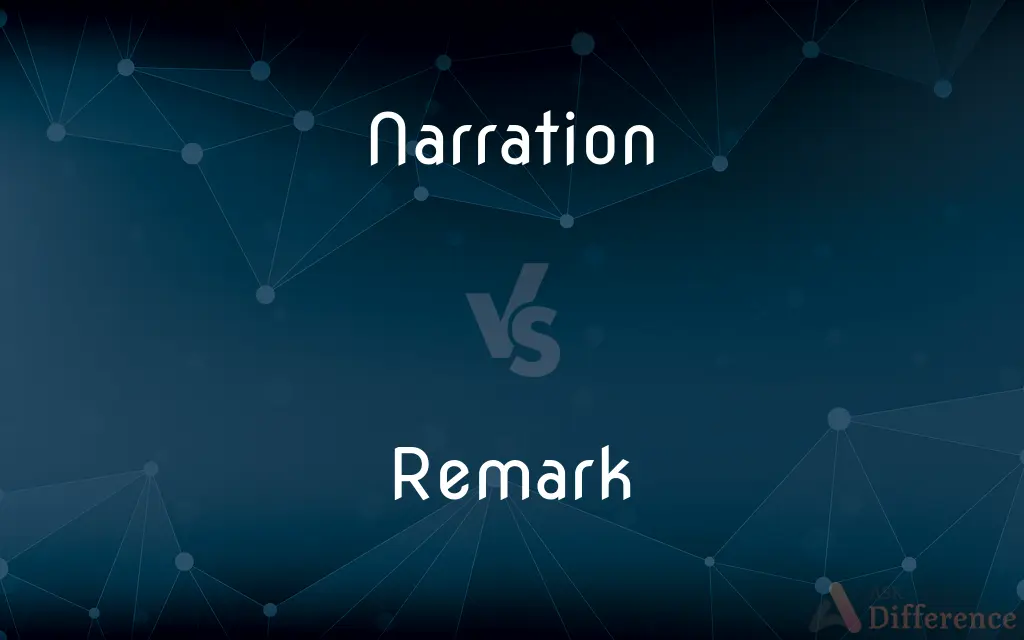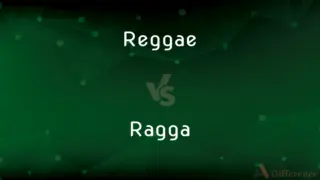Narration vs. Remark — What's the Difference?
By Maham Liaqat & Urooj Arif — Updated on March 29, 2024
Narration involves the detailed telling of a story or an event, focusing on content and structure, while a remark is a brief comment or observation, often spontaneous and less structured.

Difference Between Narration and Remark
Table of Contents
ADVERTISEMENT
Key Differences
Narration refers to the act of telling a story or describing a sequence of events in detail. It is a fundamental aspect of literature, film, and oral storytelling, where the narrator guides the audience through the plot, setting, and character developments. Remark, on the other hand, is a brief comment or observation made about something or someone. Remarks can be made in various contexts, such as in conversation, in writing, or as part of a speech. They are often spontaneous and reflect the speaker's immediate thoughts or reactions.
Narration can be in the first person, where the narrator is a character within the story, or in the third person, where the narrator is outside of the story, offering a broader perspective. The primary focus of narration is on the structure, content, and delivery of the story. Remarks can be positive, negative, neutral, or sarcastic, depending on the intent of the speaker. Unlike narration, which is detailed and structured, remarks are less formal and more fleeting in nature.
While narration is structured and detailed, often forming the backbone of literary and cinematic works, remarks are fleeting and spontaneous, serving to express quick observations or reactions. Narration requires careful planning and execution to effectively convey a story or event, whereas remarks are more about immediate expression. This difference highlights the distinct roles narration and remarks play in communication and storytelling.
In the realm of storytelling, narration is essential for developing the plot and characters, providing context, and engaging the audience. It allows storytellers to craft detailed worlds and complex narratives. Meanwhile, remarks can add depth to characters or provide insight into the thoughts and feelings of the speaker. They can also serve as a tool for interaction, allowing for the exchange of ideas and opinions in a concise manner.
Narration often serves a broader purpose, such as educating, entertaining, or informing an audience, by taking them on a journey through the storyteller's crafted narrative. Remarks, by contrast, often serve more immediate purposes, such as clarifying a point, making a quick observation, or expressing an opinion in a conversation or discussion.
ADVERTISEMENT
Comparison Chart
Definition
The act of telling a story or describing events in detail.
A brief comment or observation made spontaneously.
Purpose
To convey a structured and detailed account of events, characters, and settings.
To express a quick thought, observation, or reaction.
Structure
Detailed and organized, often following a clear narrative arc (beginning, middle, end).
Less structured, can be spontaneous and vary in form (e.g., verbal, written).
Length
Typically longer, encompassing entire works or significant portions of texts or speeches.
Short, concise, and to the point.
Context
Used in literature, film, storytelling, and any scenario requiring detailed storytelling.
Can be found in everyday conversation, discussions, speeches, and informal or formal writing.
Compare with Definitions
Narration
The process of recounting a sequence of events or a story.
The novel's narration switches between past and present, weaving a complex tale.
Remark
A comment that reveals deep understanding or observation.
His insightful remark on the novel's theme provoked a thoughtful discussion.
Narration
The perspective from which the story is told, shaping the reader's experience.
The narrative voice of the memoir is both humorous and poignant, drawing readers in.
Remark
A comment made without much thought or preparation.
Her offhand remark about the weather lightened the mood.
Narration
A narrator whose credibility is compromised.
The story's intrigue is heightened by the presence of an unreliable narrator.
Remark
A comment marked by or given to using irony in order to mock or convey contempt.
The sarcastic remark about her cooking skills was meant in jest.
Narration
A method of narration that attempts to capture the flow of thoughts.
The stream of consciousness narration delves deep into the protagonist's psyche.
Remark
A short, often spontaneous comment or observation.
His remark on the painting highlighted its unique blend of colors.
Narration
A style that emphasizes vivid descriptions of settings and characters.
The descriptive narration painted a vivid picture of the bustling, vibrant city.
Remark
A final comment at the end of a speech or written piece.
The speaker's closing remark left the audience inspired and motivated.
Narration
Narration is the use of a written or spoken commentary to convey a story to an audience. Narration is conveyed by a narrator: a specific person or unspecified literary voice, developed by the creator of the story, to deliver information to the audience, particularly about the plot (the series of events).
Remark
To express briefly or casually as a comment
She remarked that he danced very well.
Narration
The act, process, or an instance of narrating.
Remark
To take notice of something; observe
"She climbed the stone steps quickly, remarking the queer look of her blue silk skirt and blue shoes upon the stone" (Virginia Woolf).
Narration
Narrated material.
Remark
An act of pointing out or noticing; notice or observation.
Narration
The act of recounting or relating in order the particulars of some action, occurrence, or affair; a narrating.
Remark
An expression, in speech or writing, of something remarked or noticed; a mention of something
Make a remark
Pass a remark
A biting remark
A funny remark
A spoken remark
Narration
That which is narrated or recounted; an orderly recital of the details and particulars of some transaction or event, or of a series of transactions or events; a story or narrative.
Remark
A casual observation, comment, or statement
Narration
(rhetoric) That part of an oration in which the speaker makes his or her statement of facts.
Remark
(engraving) remarque
Narration
The act of telling or relating the particulars of an event; a recital of certain events, usually in chronological order; rehearsal.
Remark
Alternative spelling of re-mark
Narration
That which is related; the relation in words or writing of the particulars of any transaction or event, or of any series of transactions or events; a narrative; story; history.
Remark
(transitive) To pay heed to; notice; to take notice of, to perceive.
Narration
That part of a discourse which recites the time, manner, or consequences of an action, or simply states the facts connected with the subject.
Remark
To pass comment on (something); to indicate, point out.
Narration
The act of giving an account describing incidents or a course of events;
His narration was hesitant
Remark
To mark (someone or something) out; to distinguish, to make notable.
Narration
(rhetoric) the second section of an oration in which the facts are set forth
Remark
To express in words or writing; to state, as an observation.
He remarked that it was getting late.
Remark
(intransitive) To make a remark or remarks on, to comment on (something).
Remark
Alternative spelling of re-mark
Remark
To mark in a notable manner; to distinquish clearly; to make noticeable or conspicuous; to piont out.
Thou art a man remarked to taste a mischief.
His manacles remark him; there he sits.
Remark
To take notice of, or to observe, mentally; as, to remark the manner of a speaker.
Remark
To express in words or writing, as observed or noticed; to state; to say; - often with a substantive clause; as, he remarked that it was time to go.
Remark
To make a remark or remarks; to comment.
Remark
Act of remarking or attentively noticing; notice or observation.
The cause, though worth the search, may yet eludeConjecture and remark, however shrewd.
Remark
The expression, in speech or writing, of something remarked or noticed; the mention of that which is worthy of attention or notice; hence, also, a casual observation, comment, or statement; as, a pertinent remark.
Remark
A statement that expresses a personal opinion or belief;
From time to time she contributed a personal comment on his account
Remark
Explicit notice;
It passed without remark
Remark
Make mention of;
She observed that his presentation took up too much time
They noted that it was a fine day to go sailing
Remark
Make or write a comment on;
He commented the paper of his colleague
Common Curiosities
How does the length of a narration compare to a remark?
Narrations are typically longer and more detailed, whereas remarks are short and concise.
Can a remark be part of a narration?
Yes, remarks can be incorporated into narration as part of character dialogue or the narrator's commentary.
Can a narration be subjective?
Yes, especially if it employs a first-person narrative voice or an unreliable narrator, it can be subjective.
What role does the narrative voice play in narration?
It shapes the audience's perspective and experience of the story, affecting how the narrative is perceived.
How do remarks contribute to character development?
Remarks can reveal a character's personality, beliefs, and reactions, adding depth to their portrayal.
How does the structure of narration differ from that of a remark?
Narration is structured and detailed, often following a narrative arc, while remarks are brief and less formal.
What is the main purpose of narration?
To tell a story or describe events in detail, providing structure, context, and depth to the narrative.
Are sarcastic remarks always negative?
Not necessarily; they can be humorous or critical, depending on the context and delivery.
Can a narrative be non-linear?
Yes, narratives can be non-linear, jumping between different times or perspectives to tell a story.
Are remarks always spoken?
No, remarks can be both spoken and written, depending on the context.
What distinguishes a closing remark?
It's a final comment that summarizes, concludes, or leaves a lasting impression on the audience.
What makes a remark insightful?
An insightful remark reveals deep understanding or a novel observation about a subject.
Is stream of consciousness a type of narration?
Yes, it's a technique used in narration to represent the flow of thoughts in a character's mind.
Can remarks affect the outcome of a story?
Yes, especially in dialogues, remarks can influence characters' decisions and the story's direction.
What makes a narration effective?
Effective narration engages the audience, clearly conveys the story or message, and is coherent and compelling.
Share Your Discovery

Previous Comparison
Reggae vs. Ragga
Next Comparison
Courage vs. StupidityAuthor Spotlight
Written by
Maham LiaqatCo-written by
Urooj ArifUrooj is a skilled content writer at Ask Difference, known for her exceptional ability to simplify complex topics into engaging and informative content. With a passion for research and a flair for clear, concise writing, she consistently delivers articles that resonate with our diverse audience.
















































